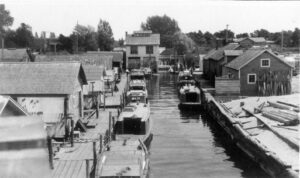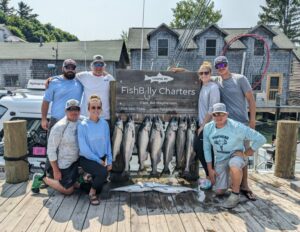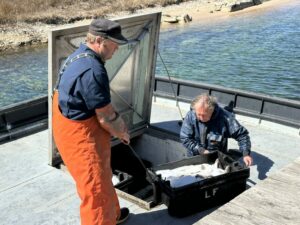I’ve been a frequent visitor of Fishtown my whole life, though I never realized how important the fishing industry and aquatic ecosystem is to this place until I became an intern at Fishtown Preservation. While I know that Fishtown’s deepest roots are fishing, today the town has evolved into more than a fishing village. Over the years it has transitioned into a place many come to visit from near and far for local cuisine, shopping, and tourism. Though the fishing industry is still busy, there is so much else going on in Fishtown that it deserves some extra recognition.
The Leland River, originally called Carp River, is a shallow river that begins from north Lake Leelanau and flows over a dam and through Fishtown into Lake

Leland Power House, ca. 1930s. Erhardt Peters Collection, Photo courtesy of Leelanau Historical Society
Michigan. This historic river was harnessed for several different purposes in the early settlement of Leland. Early on the river powered a sawmill, and later the waterfall’s strong falling current was used to generate electricity for the village and beyond. Built in 1908, the Power House had large rotating water turbines positioned right before water drops over the edge. It served the community for a few decades, then fell into disrepair and was dismantled in the early 1950s. For the fish, the damming of the river was important because they could no longer swim upstream without the help of a fish ladder.
Those who visit Fishtown today will still see a dam regulating the waters of Lake Leelanau, but there is also a bridge that enables visitors to cross to and from the Falling Waters Lodge. Pausing there I often see many people fishing off the hotel decks and on the docks in Fishtown, and I’ve learned that no matter what time of year it is, there will be people fishing in Fishtown. Throughout the year you can find many different types of fish that are looking for a safe place to lay eggs or some that prefer the river seasonally. Coming in from Lake Michigan you may see minnow, carp, and smallmouth bass during the early summer. Salmon appear in the fall as they attempt to jump the dam in hopes of locating a place to spawn, and steelhead are present through the spring.
While Lake Michigan is home to a wide variety of fish species it has faced challenges over the years from invasive species. The most devastating of them was the sea lamprey. They struck in this area during the 1940’s and are still present to this day. They are not as much of a problem now, however, thanks to modern  solutions that control their populations. The lamprey devastated the local fish populations and made it nearly impossible for all fishermen to bring in a good catch.
solutions that control their populations. The lamprey devastated the local fish populations and made it nearly impossible for all fishermen to bring in a good catch.
Fishtown is a place where commercial fishermen and charter fisherman intermingle. Anyone who visits Fishtown should keep alert for the hustle and bustle that happens when Joy, a trap net boat, comes in after a long day of checking nets for whitefish. People stop what they’re doing to observe the organized flow of the fishermen pulling heavy boxes full of ice and fish from the Joy to Carlson’s, the local Fishery, where it is processed and sold for consumption. On the docks, not only will you find the Joy unloading its catch, you will also find charter fishermen unloading the fish off their boats that they’ve caught with their customers. Many people stand on the dock posing with their prized catch for all to see.
An amazing thing about Fishtown is that the fish that visitors see being unloaded from the dock have come from the Manitou Passage, just off the shore from Fishtown. I have had the wonderful opportunity to join Captain Joel Peterson and his dad, Alan, on the Joy to check the nets they have set in Lake Michigan. We departed in the early morning at 5 AM after stocking the Joy with around seven containers of ice, each weighing around 80 pounds. As we traveled to the nets, we shared stories about our families and what the significance that this place has in our hearts. Joel said that he has worked on the Joy for 15 years. I was curious about what has kept him in this industry after all these years and he explained that he enjoys being on the water and that being his own boss plays a healthy role in his work life. And he loves catching whitefish.
Through these new experiences I have just begun to learn about the still thriving fishing industry that, despite a constantly changing, environment continues year after year. I am appreciative of the dedication put forth by our fishermen—and love having fresh fish just a few steps away in town.
